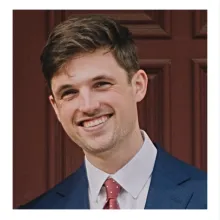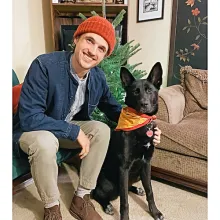From Syrup to CyVerse: Meet Michael Culshaw-Maurer
The newest member of CyVerse's Science and Training team combines his interests in ecology with teaching data science and computational skills. And never misses a canoe trip.

Culshaw-Maurer in Grover Hot Springs State Park, California. Image credit: Lea Pollack.
Michael Culshaw-Maurer began his science journey at St. John's University, "in the middle of nowhere - Minnesota," he said. "A great place to get into ecology."
"There are eight lakes on campus and acres of woodland. I studied everything from maple syrup production to ecophysiology of Daphnia – water fleas."

Michael Culshaw-Maurer
With a Bachelor of Arts in biology, Culshaw-Maurer moved on to join the Graduate Group in Ecology at the University of California, Davis, jointly advised by Jay Rosenheim and Sebastian Schreiber. His PhD focused on disease-induced cannibalism in insects and the ecology of fear in agricultural insect pests.
In predator-prey or parasitoid-host relationships, he explained, predators don't always just kill their prey. Their presence in the ecosystem induces changes in prey behavior traits, such as a greater tendency to run away or hide. They may also induce physiological changes, such as to metabolic rates or reduced reproduction.
"My broadest research interests in pest management are how we can utilize these relationships to give us options to reduce pest impacts," he said, other than just lethal effects of predators, or chemical sprays – which also have downstream negative impacts on the environment.
During his time at UC Davis, Culshaw-Maurer found his interests in data science and computational approaches growing alongside his lab and field work.
He taught R and Git to both undergraduate and graduate students, and he taught computational skills with The Carpentries, a global community project bringing foundational coding and data science skills to researchers worldwide. He helped run the UC Davis R users groups. He co-founded and helped lead the UC Davis ecological statistics support group.
While still finishing his doctoral thesis, Culshaw-Maurer applied for a joint postdoctoral position with CyVerse and The Carpentries.

Culshaw-Maurer and Gouda.
"I thought it was a cool opportunity to get even more involved with teaching," he said, "as well as providing the computational power and infrastructure service that CyVerse offers." He began his new postdoc on the tail of a whirlwind scramble to finish his PhD.
Culshaw-Maurer's primary focus at CyVerse is to further develop training materials and curricula, including leading the Foundational Open Science Skills and Container Camp programs.
"We are excited for Michael to join our team and to contribute to the future of open science," said Tyson Swetnam, CyVerse Co-Principal Investigator and a Research Assistant Professor of Geoinformatics at the University of Arizona's BIO5 Institute. "With his combined background in ecology and data science and his enthusiasm for teaching, he brings a critical set of skills to our science and training team."
When he's not doing science, learning science, or teaching science, Culshaw-Maurer is an avid digital and film photographer, hiker, and outdoorsman. He hasn't missed an annual canoe trip with his family in the boundary waters of northern Minnesota since his first trip, at the age of four. He lives in Houston, TX, where his wife holds a postdoctoral fellowship position in behavioral ecology with the National Science Foundation. "We also have a cute, crazy dog named Gouda," he noted. "And I think that covers the bases."
Follow him on Twitter @CulshawMaurer.

